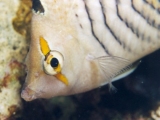12 March 2008
Global warming turns fish deaf
 Is it important that global warming turns fish deaf? Yes. For coral reef fish, sound is vital for them to judge where to settle down and live.
Is it important that global warming turns fish deaf? Yes. For coral reef fish, sound is vital for them to judge where to settle down and live.After hatching, reef fish larvae are dispersed by ocean currents for a few weeks. The larval fish must then find their way back to a suitable reef to make their home.
It's thought that the young fish home in on high-frequency noises. Coral reefs are extremely noisy environments, with the crackle of snapping shrimps and the chatter of fish set against a backdrop of wind, rain and surf. Sound carries well underwater, and most fish have great hearing.
Global warming and more acidic oceans, though, can cause fish to be born with deformed earbones. Reasearchers at the Australian Institute of Marine Science in Townsville and the University of Edinburgh, suspected that it might be harder for these fish to pinpoint the origin of a sound, increasing the chance they would get lost in the ocean. And, indeed, their results show that this is so.
Journal References and Further Reading:
Proceedings of the Royal Society, Volume 275, Number 1634 / March 07, 2008
Animal Behaviour, doi:10.1016/j.anbehav.2007.11.004
SOUND: The essential navigation cue for young reef fishes to find their way home
--
What do you think of this news item? Start a discussion.
Bookmark with: del.icio.us | Digg | Newsvine | NowPublic | Reddit
|
--
Subscribe to SCUBA News (ISSN 1476-8011) for more free news, articles, diving reports and marine life descriptions - http://www.scubatravel.co.uk/news.html

Labels: coral reef, environment, fish, marine biology, research, sealife
 Subscribe to SCUBA News (ISSN 1476-8011) for more news, articles, diving reports, reviews and marine creature of the month.
(SCUBA News is published by SCUBA Travel once a month. Will will keep your e-mail address confidential and only use it to send you the monthly newsletter.)
Subscribe to SCUBA News (ISSN 1476-8011) for more news, articles, diving reports, reviews and marine creature of the month.
(SCUBA News is published by SCUBA Travel once a month. Will will keep your e-mail address confidential and only use it to send you the monthly newsletter.)
